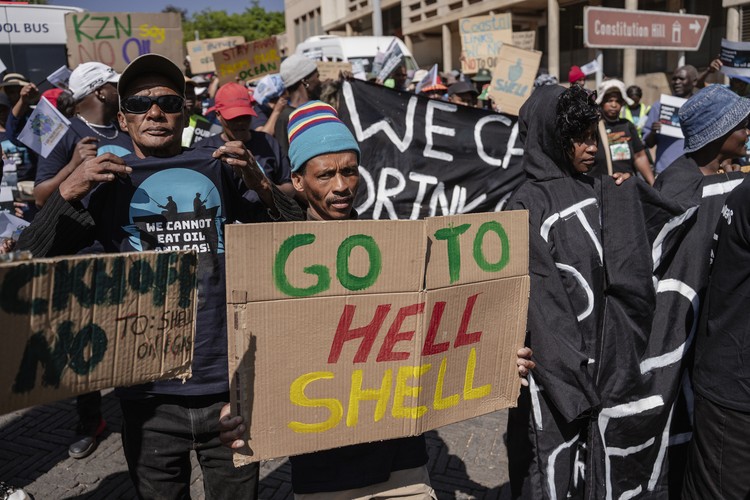
16 September 2025
About 200 activists marched to the Constitutional Court in Johannesburg on Tuesday to support Wild Coast communities opposing seismic surveys and oil exploration rights granted to Shell and Impact Africa. Photo: Ihsaan Haffejee
About 200 people gathered outside the Constitutional Court in Johannesburg on Tuesday to support Wild Coast communities in their legal challenge to Shell and Impact Africa’s seismic surveys and oil exploration rights.
Another group protested in Gqeberha in solidarity with the Wild Coast activists and communities.
In Johannesburg, protesters came from various Wild Coast communities and were supported by activists from Gauteng, KwaZulu-Natal and small-scale fishers from the West Coast.
Activists say that while the case specifically involves the Wild Coast, they wanted to show solidarity because their communities face similar environmental threats from fossil fuel exploration.
Protesters carried banners and placards, some which read, “We cannot eat oil and gas,” and “To hell with Shell.”
Wild Coast communities and environmental organisations argue that Shell’s exploration right is a threat to the environment and the livelihoods of local communities. Photo: Ihsaan Haffejee
Seismic surveying, which involves controversial airgun blasting towards the seabed, was halted through court action by Wild Coast communities and environmental organisations. The court found that Shell’s Wild Coast oil exploration right was granted unlawfully in 2014 due to inadequate community consultation.
On Tuesday, the apex court heard argument around the ruling by the Supreme Court of Appeal (SCA), which agreed with a High Court ruling that the granting of the right was unlawful, but suspended this finding to allow Shell the opportunity to apply to renew the right for a third time.
Wild Coast communities and environmental organisations believe the SCA order cannot stand. It would, in effect, be perpetuating an illegality because the exploration right had been set aside, they argue.
Activists who came from across the hearing say that while this case specifically involved communities of the Wild Coast, they wanted to show solidarity because they face similar environmental threats around fossil fuel exploration in their coastal communities. Photo: Ihsaan Haffejee
Nonhle Mbuthuma, spokesperson for the Amadiba Crisis Committee, a community group in Xolobeni on the Wild Coast, said: “This is not the type of development we want in our communities. We want sustainable solutions that protect our environment and oceans. It is our environment that sustains us. We eat fish, not oil and gas.”
Lungelo Mtwa, from Sustaining the Wild Coast, had travelled from his village near the Mtentu River in Pondoland. He said the exploration of oil and gas on the Wild Coast threatened the way of life they had practised for centuries.
“Oil and gas are temporary. Those that want it have short-term thinking and are not looking to the future. That is why we are fighting here, not just for us but for our children and grandchildren,” said Mtwa.
Lucien Limacher, from Natural Justice, an applicant in the case, described the ongoing case as “a battle for the Wild Coast.”
“We want a new environmental authorisation to be undertaken so that communities can have an opportunity to make representations and be involved in the consultations that have an effect on their lives and livelihoods,” said Limacher.
Protesters waiting outside were receiving regular updates from inside the court. The hearing was still in session at the time of publication.
People gathered near the beachfront at Gqeberha’s Blue Water Bay to protest Shell’s exploration of oil and gas in solidarity with Wild Coast communities. Photo: Thamsanqa Mbovane
In Blue Water Bay, about 70 people gathered near the beachfront despite strong winds to protest the exploration of oil and gas and to show support for the Wild Coast communities’ case.
“When they drill oil and gas from the sea, many fish are going to die,” said activist Mziwoxolo Sume. “These companies say jobs will be created, but we are saying this is lip services. You need skills and experts. We are not going to backdown with this fight. They are putting our lives at risk.”
Shell’s lawyers, in their written submissions to the court, said financial prejudice to Shell and Impact, which have spent more than R1-billion in pursuit of the exploration right, should be avoided if this could be done legally and appropriately.
Argument being heard inside the Constitutional Court on Tuesday. Photo: Ihsaan Haffejee